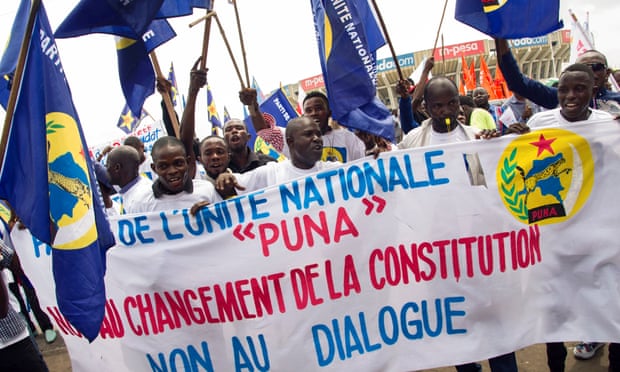 1
1The actions of President Joseph Kabila of the Democratic Republic of the Congo (DRC) make clear his intention to stay in power beyond his second term. But with the people set against it, and a strong and unambiguous two-term limit in the constitution, his ambitions are leading his country to a dangerous impasse.
Since 2010, Kabila has deployed various tactics to delay the elections, hoping that this will allow him to stay on in a transitional arrangement. He has already achieved one of his goals: the timetable for presidential elections this year is no longer feasible.
+This is a hazardous strategy. Riots in January 2015 killed dozens of people. Since then, the government has locked up leaders of civil society movements fighting to protect the country’s hard-won constitution. Given the scale of the organisational task and the lack of progress, the country will not be able to hold elections until well into next year.
Presidents clinging to power can destabilise countries. In neighbouring Burundi, breaking a post-civil war promise not to extend a presidential mandate has quickly undermined the trust, social cohesion and political accord needed to avoid conflict.
DRC suffers from overly centralised government and a patronage system in the hands of the incumbent. The deal that ended the civil war in 2002 shared the spoils of peace among former warring parties and other political hopefuls in the form of a government of national union, and then through a broad-based governing majority.
The limit on presidential terms gave a guarantee that power would eventually be rotated, even if, at the time, short-term gains were at the forefront of most minds. Unless Kabila moves on, prominent and popular politicians, many his former allies, could be out in the cold for good. Facing a stubborn regime with less and less legitimacy, some may decide that violence is the only way to force change.
Activists see term limits as a weathervane of democratic progress. Term limits are now in place across southern Africa, although in countries dominated by strong liberation parties, the presidency has passed to someone from within the ruling party: Tanzania, Namibia and Mozambique. In Nigeria, Zambia and Senegal, presidential ambitions to stay on have been thwarted by rival elites or strong institutions, such as parliament and civil society. The president of Niger’s bid to cling to power was thwarted by his own army.
Central Africa has a particularly bad record. Weak institutions and centralised power have handed incumbents a huge advantage, not only in winning elections, but also in changing constitutions. International partners, including some aid donors, have not voiced concern often enough, worried that too much democracy could upset fragile stability. Since the democratic advances of the early 1990s, Central African Republic is the only state to have had a proper democratic handover of power, in 1993. That’s a very troubling record.
In DRC, the peace agreements of 2002 that introduced the presidential term limit brought welcome stability. But the deal kicked justice issues into the long grass and did not address centralised and corrupt governance. Kabila, like his counterpart in Burundi, is almost certainly worried that justice for violence committed in the civil war may catch up with him if he leaves office.
Trust, stability and the cohesion of the political system therefore lie at the heart of the “third term” question. African leaders considering these issues, in the African Union (AU) and elsewhere, face complex dilemmas. Some don’t believe in the principle of regularly handing over power. Others don’t want to interfere in the internal affairs of a neighbour, unless the instability threatens their borders.
Western powers promoting term limits therefore have no common African position to rally behind. They have also been frustratingly inconsistent, playing down Rwandan president Paul Kagame’s machinations to serve another term, while condemning the decision of the Burundian president, Pierre Nkurunziza, to run for re-election.
Pressure needs to be put on those unwilling to leave, but there comes a point when leaders are so entrenched that there seems little point in challenging their right to hold office. Calling it early is therefore vital. That is what the international community failed to do when Kabila removed the second round of the presidential elections in 2011 and went on to win a fraudulent election in November of that year.
A political system is based on trust that everyone will abide by the rules to at least a minimum extent; without that, stability will be short-lived. The international community should speak out at the right moment against leaders overturning constitutional provisions to suit their own agenda. This is especially true when previous conflict means trust is in short supply or faith in elections as a means of transferring power has been undermined.
Failure to speak out sends a message to opposition leaders that the only way to power is through violence – a conclusion that would spell disaster for DRC and other countries in the region.
Richard Moncrieff is central Africa project director at International Crisis Group

No comments:
Post a Comment